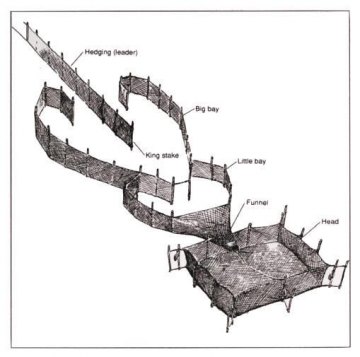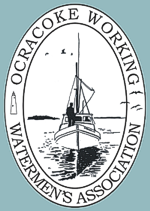Flounder Fishery Swamped by Sandy
Hurricane Sandy carried away nets, broke leads and lines, filled pound nets with grass and detritus, toppled stakes, and ran a lot of the fish away, said Ocracoke Working Watermen's Association Manager Hardy Plyler. The storm cost the watermen several weeks of income as they repaired their gear.

"We were having one of the best years, in size and volume. There were a lot of jumbos," said Plyler, himself a pound net fisherman. Prices for flounder were also higher than they have been in the recent past.
Sandy's impact happenened during the peak two weeks of the season.
"Fishermen took a major economic hit," said David Hilton. He has three nets in the water and sits on the OWWA board of directors. The damage to nets also meant "the fish house did not get to harvest those fish, and people we employ had their hours cut."
With Sandy moving along about 250 miles offshore, Ocracoke fishermen gambled by leaving their nets in the water. It is a lot of work to bring in the fixed nets, which draw fish along a long lead net into a trap, where the fish are then hauled alive before heading to market. "We thought 250 miles would be enough," said Plyler, who, along with his colleagues, didn't expect the outer bands of wind to strike Pamlico Sound at speeds greater than 50 miles per hour.
Luck is relative. Some fishermen found their nets damaged, but in place. Others "got hit really hard," said Hilton, and "not only were their nets not fishing, but not where they left them."
"Anything over 50 miles per hour and the nets won't stand it," said waterman Beaver Tillett. "There was too much wind, too much tide, and too much grass." Tillett depends upon fall pound net fishing for about half of his yearly income. When Marine Fisheries regulations close the flounder season on December 1, Tillett will turn his attention to his waterfowl guide service.
The first few weeks of the season, which begins in early September, allow watermen to pay their expenses. They need reliable fishing for the next several months to earn a profit. "With a grind like this, it's terrible," said Tillett, adding that "North Carolina flounder are going to be a hard thing to get" on your table this fall.
Any hard blow will "run a lot of fish out of here," said Plyler.
"A flounder, once he moves, he don't come back," said Tillett.
A bad pound net season can have a "tremendous influence" on the bottom line not just for local families, but for the OWWA, a non-profit collective of Ocracoke watermen, said Plyler.
The organization is still in the black, as most of the boys have gotten their nets back, and are once again at work, said Plyler. While the catch has not rebounded to pre-Sandy levels, they're doing "pretty good," and "catching some" fish. "Bill Evans got a few today," reported Plyler. With fewer fish on the market, the price is better for the fish that are caught.
Sandy blew through the Eastern seaboard, and trawlers working out of Massachusetts, New York and New Jersey lost work and sustained damage as well, said Hilton, a former Marine Fisheries Commissioner.
Normally, "a lot of founder gets put on the market to the north of us," noted Hilton. The prices for flounder have gone up almost $1 per pound in the past several weeks. "It's economics 101, supply and demand."
Sheepshead, black drum, pompano and butterfish are also caught in pound nets, and sold by Ocracoke boats to OWWA, which in turn sells them to larger distributors.
One bright spot in the future is the annual OWWA Oyster Roast, to be held Saturday, December 29.




